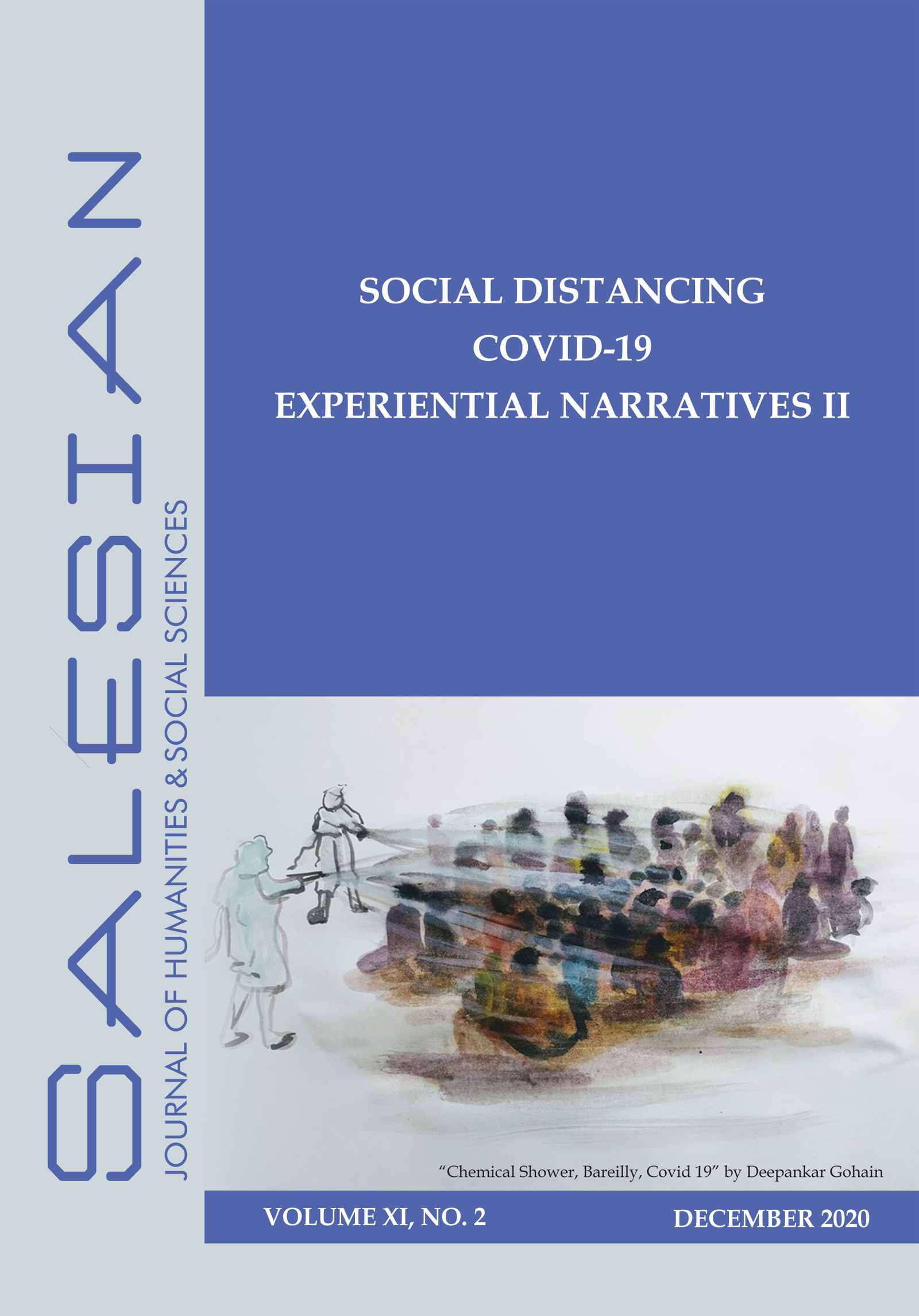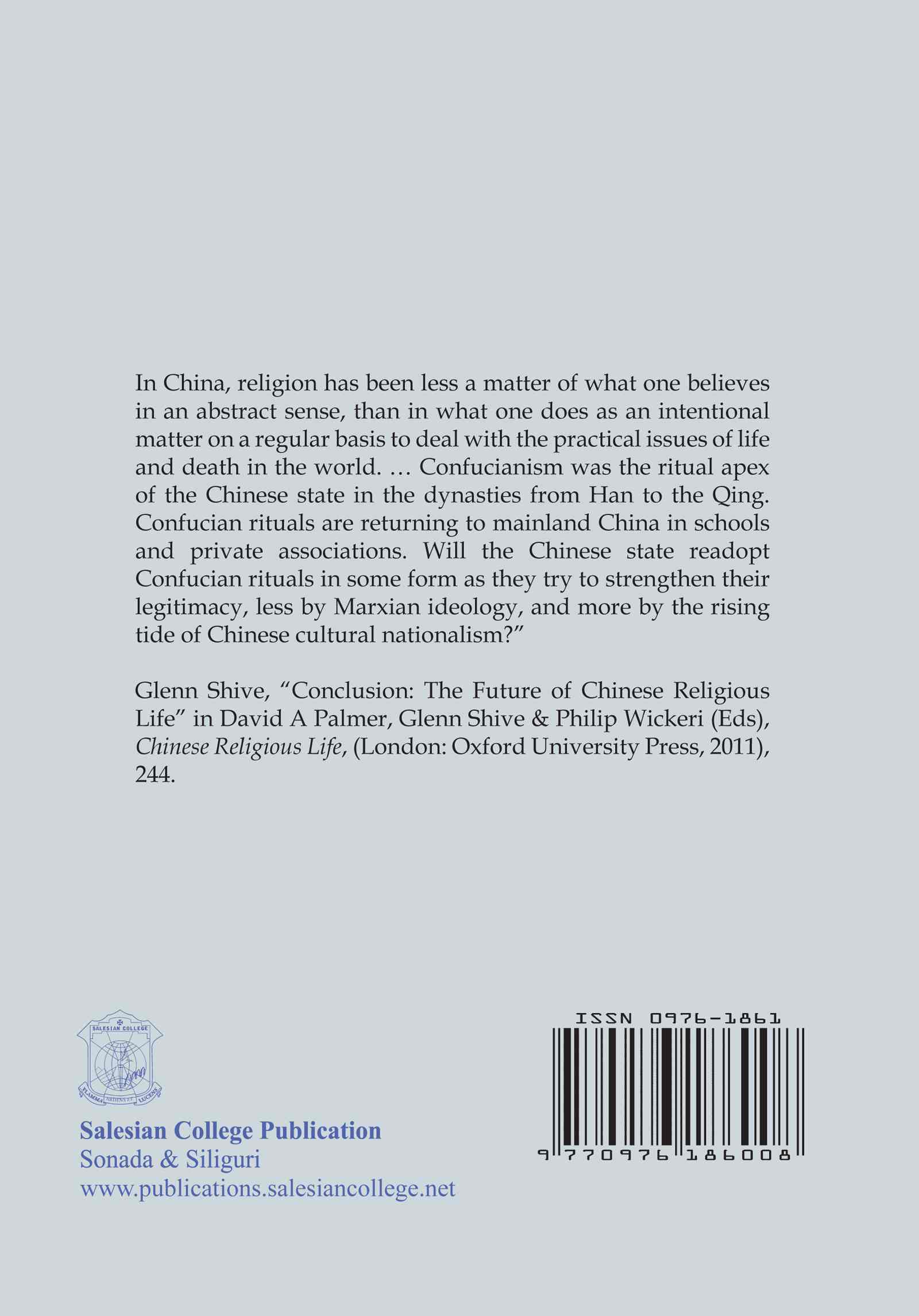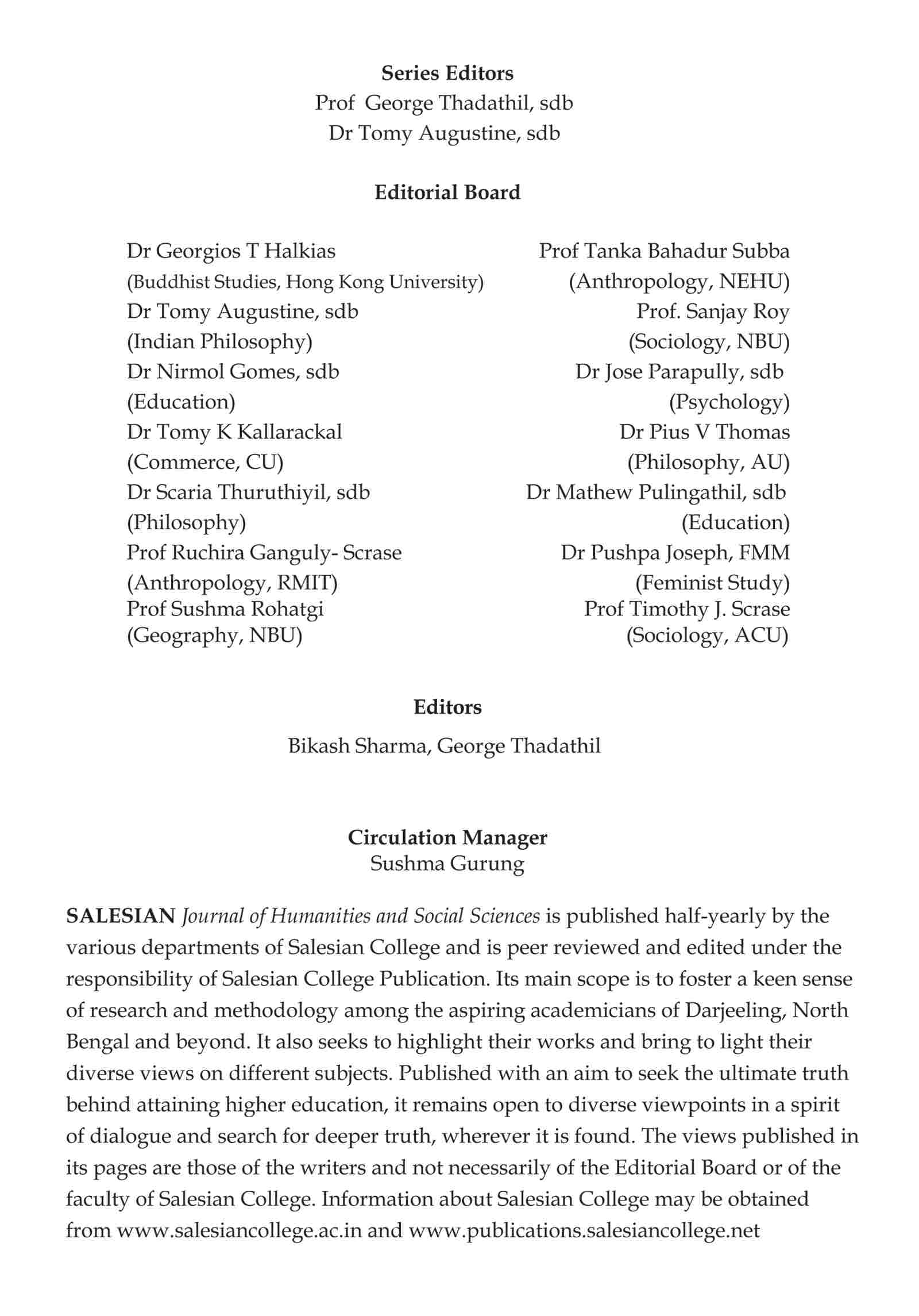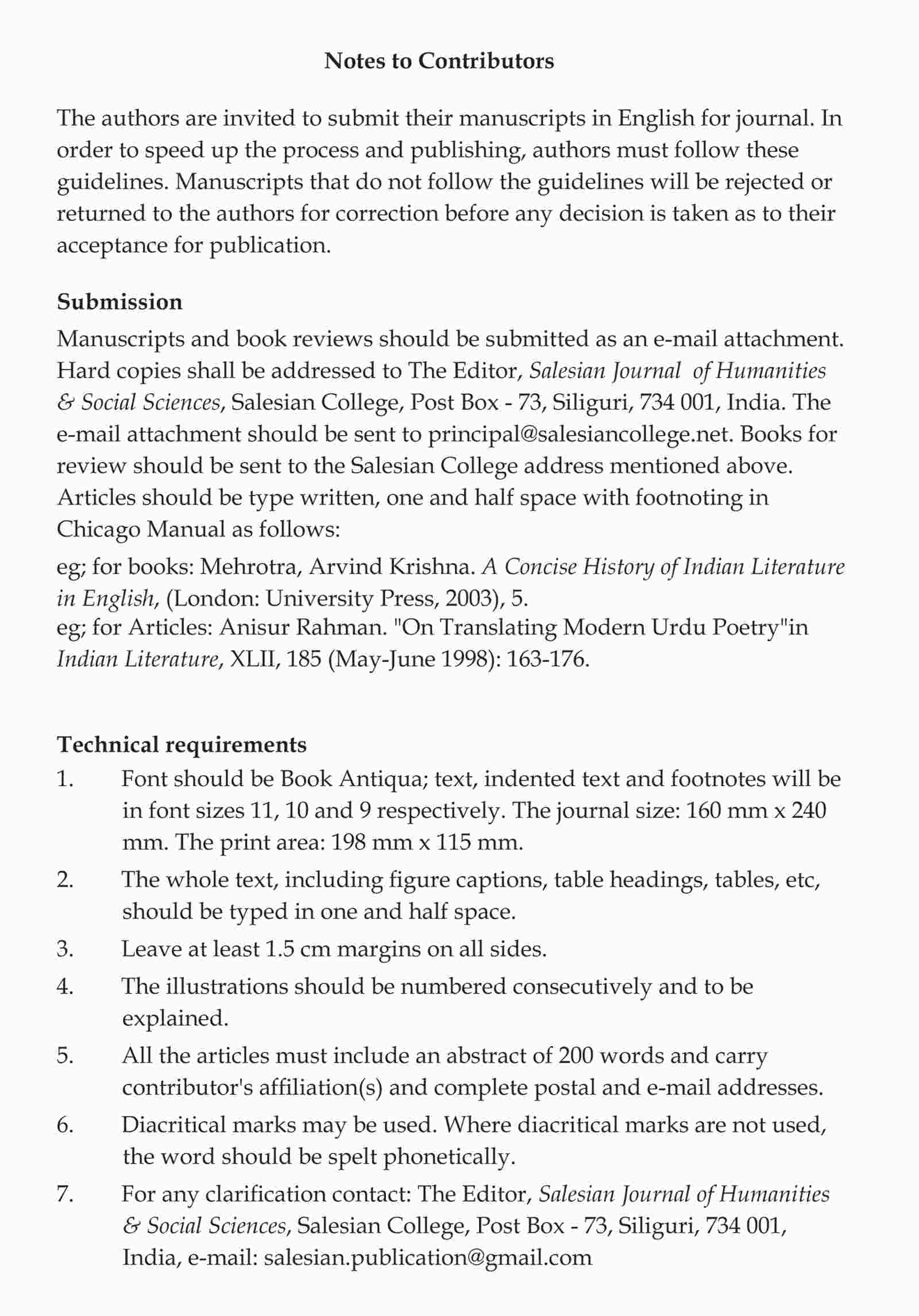Journals
Contents
Salesian Journal of Humanities and Social Sciences, Vol. XI, No. 2. (December 2020)
Social Distancing, COVID-19, and Experiential Narratives II
ISSN: 0976-1861
Section: Contents
Contents
Salesian Journal of Humanities and Social Sciences,
Vol. XI, No.2 (Dec 2020)
ISSN: 0976-1861 Section: Contents
SOCIAL DISTANCING, COVID-19, AND EXPERIENTIAL NARRATIVES II | ||
ISSN 0976-1861 | December 2021 | Vol. XI, No.2 |
CONTENT | ||
Editorial Bikash Sarma | v | |
Original Articles: |
| |
Pain: The Door to Agony and Ecstasy in Time of Covid-19 Pandemic George Thadathil | 1 | |
Media, Power and the Pandemic: Production of Fear, Discipline and a Distraught Self Saravanan Velusamy | 13 | |
Indian workers in Dubai: City, Fear and Belongingness Abhijit Ray | 34 | |
Befriending the Broken: Understanding the Post-Pandemic Body Soroj Mullick | 55 | |
The Poumai Naga agricultural festivities and rituals vis-a-vis folklores: Covid-19 pandemic application Paul Punii & Dominic Meyieho | 77 | |
A Longitudinal Study on the Psycho-Sociological Impact of COVID -19 lockdown on College Students & Faculty Augustin Joseph, James Chacko Molekunnel, Paramita Datta, Patrick Johnson, Rachel Salomit Sitling & Sumina Chettri. | 106 | |
General Commentary |
| |
Will the Circus come to town?: Indian Circus Arts swinging between a Kafka moment and a nouveau moment Anmol Mongia | 123 | |
Boredom, time and the creative self during a lockdown Vasudeva K. Naidu | 130 | |
Book Reviews |
| |
Silvia Federici, Caliban and the Witch: Women, the Body and Primitive Accumulation By Shruti Sharma | 135 | |
J. P. Gurung, All in a Cup of Tea By Samip Sinchuri | 141 | |
Our Contributors | ||
Notes to Contributors |
Editorial
Editorial
Bikash Sarma
Bikash Sarma teaches history of ideas and political history at the Department of Political Science, Salesian College, Siliguri.
Editorial
Salesian Journal of Humanities and Social Sciences, Vol. XI, No.2 (Dec 2020)
ISSN: 0976-1861 | DOI: 10.51818/SJHSS.11.2020.v-viii | Page: v-viii,
Section: Articles
Editorial
Social Distancing, Covid-19, and Experiential Narratives II
Bikash Sarma teaches history of ideas and political history at the department of Political Science, Salesian College, Siliguri.
As we are steering through an unprecedented epoch of Covid-19, desperate attempts have been made to renew existential meanings as an underside to the unbridled meaninglessness and existential defeat in the world outside.
As the “everyday familiarity collapse[d]” and uncanniness or ‘un-home-like’ took over, the spatially constrained and temporally disoriented self began an anxious search for the “metaphor for existence.”1 Post the global lockdown to ‘tame’ the virus, home has become the site where the metaphor for existence is materially and discursively situated: either being at home or longing for one, as with the case of thousands of migrant workers in India who have walked miles—some to death—in search of this metaphor.
Martin Heidegger contends: In anxiety one feels ‘uncanny’. Here the peculiar indefiniteness of that which Dasein finds itself alongside in anxiety, comes proximally to expression: the “nothing and nowhere”. But here “uncanniness” also means “not-being-at-home” ...Being-in enters into the existential ‘mode’ of the “not-at-home”. Nothing else is meant by our talk about ‘uncanniness.’
In uncanniness, the self flees from the “threat to its everyday lostness”—a withdrawal from the ‘publicness’ and from the absorption in the world - even “though the very world itself is still ‘there’, and ‘there’ more obtrusively.”3 When the conceptuality—of the uncanny situation and human condition as a result of the former—is itself evasive, a metaphor not only provides the epistemological reserve for the constitution of existential concepts, but also points “back towards the connection with the life-world as the constant motivating support...”
On a similar note Leela Gandhi has made an important point on the conceptuality of a phenomenon. Apart from an expressed skepticism towards almost everything, there has emerged, “a state of consciousness about things we have known for a very long time without bringing to the forefront of understanding...It is an orientation to what is already there but so much in plain view as to be unintelligible”.
With these two crucial themes for the viral times—finding a metaphor amidst growing scepticism and for re invoking a consciousness for long distorted, we at Salesian College Publications set the journey to publish a second issue on “Social Distancing, Covid-19, and Experiential Narratives.”
George Thadathil in his paper “Pain: The Door to Agony and Ecstasy in Time of Covid-19 Pandemic” locate pain—mental and physical—at the intersections of spiritual-philosophy and contingencies of viral agony. Through an extrapolation of dialectics of vipassana as mode of being and becoming, the paper situates pain through the exegesis of experience and the current pandemic—as an expression immanent within healing.
Saravanan Velusamy in his paper “Media, Power and the Pandemic: Production of Fear, Discipline and a Distraught Self” tries to understand the role of media during pandemic times and decipher the kind of self it produces given media’s strong influence in interpreting the world for its viewers.
Abhijit Ray in the paper “Indian workers in Dubai: City, Fear and Belongingness” analyses two contradictory human experience—belongingness and fear in the context of Indian workers working in Dubai during the pandemic. He argues that the pandemic magnified certain aspects of the workers working in Dubai that often remain invisible in the popular public domain.
Soroj Mullick in “Befriending the Broken Body: Understanding the Post-Pandemic Body” approaches the impact the pandemic has had on innumerable human bodies, with a philosophico-theological reflection, building on the biblical insights into the human body and the changes it has undergone within Christian tradition.
Paul Punii & Dominic Meyieho in their paper “The Poumai Naga agricultural festivities and rituals vis-a-vis folklores: Covid-19 pandemic application” harping on the ethnographic details of Poumai Naga agricultural festivals underlines the impact of Covid-19 on these rituals.
Augustine Joseph et.al. in their paper, “A Longitudinal Study on the Psycho-Sociological Impact of COVID -19 lockdown on College Students & Faculty” brings an assessment of the fear and anxiety among the faculty and students of Salesian College. From the data accumulated through a series of online questionnaires, the paper analyses the impact of the lockdown on a diverse range of indicators—that includes boredom, aspects of the future, sociality—conducted with a group of faculty and students of the college. Anmol Mongia in her general commentary “Will the Circus come to town? : Indian Circus Arts swinging between a Kafka moment and a nouveau moment” explores the hope of revival for the once esteemed performing art form—Circus—both as an art form and a life tool.
Vasudeva K. Naidu in the general commentary “Boredom, time and the creative self during a lockdown” explicates on the conceptuality of boredom through a literary-philosophical journey during the lockdown.
Articles
Pain: The Door to Agony and Ecstasy in Time of Covid-19 Pandemic
George Thadathil
DOI: 10.51818/SJHSS.11.2020.1-12
Cite: Thadathil, George. “Pain: The Door to Agony and Ecstasy in Time of Covid-19 Pandemic.” Salesian Journal of Humanities and Social Sciences 11, no. 2 (December 12, 2020): 1–12. https://doi.org/10.51818/sjhss.11.2020.1-12.
Section: Article
Abstract
Salesian Journal of Humanities and Social Sciences, Vol. XI, No.2 (Dec 2020)
ISSN: 0976-1861 | DOI: 10.51818/SJHSS.11.2020.1-12 | Page: 1-12,
Section: Articles
Pain: The Door to Agony and Ecstasy in Time of Covid-19 Pandemic
George Thadathil is the Principal of Salesian College, Sonada and Siliguri. He is the author of Vision from the Margin and has edited and co-edited number of books besides contributing to a number of journals and edited volumes. He is the founder Director of Salesian Publications, Salesian Research Centre and Salesian Translation Centre.
Abstract
The paper attempts to locate pain - mental and physical - at the intersections of spiritual-philosophy and contingencies of viral agony. Through an extrapolation of dialectics of vipassana as mode of being and becoming, the paper situates pain through the exegesis of experience and the current pandemic - as an expression immanent within healing.
Keywords: Pain, vipassana, spiritual-philosophy, pandemic, being.
License : Salesian Journal of Humanities & Social Sciences is licensed under Attribution-NonCommercial 4.0 International
Media, Power and the Pandemic: Production of Fear, Discipline and a Distraught Self
Saravanan Velusamy
DOI: 10.51818/SJHSS.11.2020.13-33
Cite: Velusamy, Saravanan. “Media, Power and the Pandemic: Production of Fear, Discipline and a Distraught Self.” Salesian Journal of Humanities and Social Sciences 11, no. 2 (December 12, 2020): 13–33. https://doi.org/10.51818/sjhss.11.2020.13-33.
Section: Article
Abstract
Salesian Journal of Humanities and Social Sciences, Vol. XI, No.2 (Dec 2020)
ISSN: 0976-1861 | DOI: 10.51818/SJHSS.11.2020.13-33 | Page: 13-33,
Section: Articles
Media, Power and the Pandemic: Production of Fear, Discipline and a Distraught Self
Saravanan Velusamy is an M.Phil. Candidate at the Center for the Study of Social Systems, Jawaharlal Nehru University, New Delhi.
Abstract
Pandemic needs a globalized world where we have to live with the risks that come with it. Television is a crucial communication device that shapes public perception and mediates our comprehension of the outside world. It also forms part of the ideological apparatus that aids in reproducingthe dominant perception of reality among the masses. This article is based on observations made of the TRP-driven TV content produced during the lockdown period, in order to interpret the meaning that a projected reality produces. The article intertwines both: how government uses television to bring order as they tackle the situation and how advertisement on the other hand promote sales during crisis, both of which tries to convince the ‘consumer-citizen’ that these are extraordinary times but normalcy is returning. The objective of this paper is to understand the role of media during pandemic times and decipher the kind of self it produces given its strong influence in interpreting the world for its viewers.
Key Words: TRP-driven media, power, pandemic, fear and discipline, self.
License : Salesian Journal of Humanities & Social Sciences is licensed under Attribution-NonCommercial 4.0 International
Indian workers in Dubai: City, Fear and Belongingness
Abhijit Ray
DOI: 10.51818/SJHSS.11.2020.34-54
Cite: Ray, Abhijit. “Indian Workers in Dubai: City, Fear and Belongingness.” Salesian Journal of Humanities and Social Sciences 11, no. 2 (December 12, 2020): 34–54. https://doi.org/10.51818/sjhss.11.2020.34-54.
Section: Article
Abstract
Salesian Journal of Humanities and Social Sciences, Vol. XI, No.2 (Dec 2020)
ISSN: 0976-1861 | DOI: 10.51818/SJHSS.11.2020.34-54 | Page: 34-54,
Section: Articles
Indian workers in Dubai: City, Fear and Belongingness
Abhijit Ray teaches media studies at Salesian College, Siliguri.
Abstract
Even though the pandemic is portrayed in the popular narrative as a collective experience of humankind, it affected different sections of people of different spectrums indifferent ways across the world. The workers from India and other south Asian countries are living in the megacities like Dubai in the Gulf region for generations. The outbreak of the pandemic suddenly shuttered the economic arrangement of the workers carefully designed by the host and home countries over the decades. The article has mainly focused on two contradictory human experience— belongingness and fear in the context of Indian workers working in Dubai during the pandemic. In this particular time, the eagerness for ‘going back home’ was driven by these two seemingly contradictory human emotions. The focus is entirely on Dubai—which is considered by many Indians as an extended part of India. The article points out that the pandemic magnified certain aspects of the workers working in Dubai that often remain invisible in the popular public domain. The pandemic suddenly exposed the vulnerability of the workers living in foreign cities. There are chances that the pandemic experience will have a long-lasting impact on the life of the workers and the whole economic and political arrangement of the city like Dubai.
Keywords: Fear, Dubai, belongingness, pandemic, lockdown, laborers.
License : Salesian Journal of Humanities & Social Sciences is licensed under Attribution-NonCommercial 4.0 International
BEFRIENDING THE BROKEN BODY Understanding the Post-Pandemic Body
Soroj Mullick
DOI: 10.51818/SJHSS.11.2020.55-76
Cite: Mullick, Soroj. “Befriending the Broken: Understanding the Post-Pandemic Body.” Salesian Journal of Humanities and Social Sciences 11, no. 2 (December 12, 2020): 55–76. https://doi.org/10.51818/sjhss.11.2020.55-76.
Section: Article
Abstract
Salesian Journal of Humanities and Social Sciences, Vol. XI, No.2 (Dec 2020)
ISSN: 0976-1861 | DOI: 10.51818/SJHSS.11.2020.55-76 | Page: 55-76,
Section: Articles
BEFRIENDING THE BROKEN BODY
Understanding the Post-Pandemic Body
Soroj Mullick has a Licentiate in Faith Education and a Doctorate in Christian Education from the Salesian Pontifical University, Rome. He is a former faculty of Salesian College Sonada, and has written number of research papers and articles. His area of academic interest includes religion, Theology, and youth Psychology. Currently he serves as co-pastor at Bandel Basilica.
Abstract
The paper approaches the impact the pandemic has had on innumerable human bodies, with a philosophico-theological reflection, building on the biblical insights into the human body and the changes it has undergone within Christian tradition. The paper asserts that the notion of perfection on which the Christian ideals of sanctity was created over the centuries have had its negative impact in delimiting the sin dimension of being human, to the body, and in the body, to the sexual. The contemporary issues of gendered body, sexual orientation and identity, seeking expressions across the globe within the western modernity and its aftermath in the rest of the world, through the colonial expansionism needs a critique and the pandemic does a cleansing not only of the physical world but also of the inner psychic world of the post-pandemic human is what the paper delineate.
Keywords: Sexuality, gendered body, sin, pandemic, spirituality.
License : Salesian Journal of Humanities & Social Sciences is licensed under Attribution-NonCommercial 4.0 International
The Poumai Naga Agricultural Festivals and Rituals vis-a-vis Folklores: Covid-19 Pandemic Application
Paul Punii & Dominic Meyieho
DOI: 10.51818/SJHSS.11.2020.77-105
Cite: Punii, Paul, and Dominic Meyieho. “The Poumai Naga Agricultural Festivities and Rituals Vis-a-Vis Folklores: Covid-19 Pandemic Application.” Salesian Journal of Humanities and Social Sciences 11, no. 2 (December 12, 2020): 77–105. https://doi.org/10.51818/sjhss.11.2020.77-105.
Section: Article
Abstract
Salesian Journal of Humanities and Social Sciences, Vol. XI, No.2 (Dec 2020)
ISSN: 0976-1861 | DOI: 10.51818/SJHSS.11.2020.77-105 | Page: 77-105,
Section: Articles
The Poumai Naga Agricultural Festivals and Rituals vis-a-vis Folklores: Covid-19 Pandemic Application
Paul Punii is a research scholar from Assam Don Bosco University Dominic Meyieho is an Assistant Professor at Assam Don Bosco University
Abstract
The traditional Poumai Naga People are basically agrarian and their lives revolve around it. Poumais are distributed into Paomata, Chilivai, Lepaona, and Razeba. As agrarian people they sow paddy; Daonü, Tainü, Marunü, Louka are festivals to usher the sowing of paddy. Duh is the ritual celebration for good seed. Paoki is the feast of plantation. Laonü is the post plantation festival. Nge is ritual celebration asking God to preserve the paddy from the attack of pestilence. Baoloutouyu is the prayer for abundance and eating of the first fruits. Thounü is the New Year thanksgiving celebration with abundance of food and wine. The festivals and rituals that preserve a community act as a deterrent to exceptional events like the Pandemic in the community history is a subterranean argument in the paper.
Keywords: Festivity, folklores, pandemic, Poumai rituals, agrarian practices.
License : Salesian Journal of Humanities & Social Sciences is licensed under Attribution-NonCommercial 4.0 International
A Longitudinal Study on the Psycho-Sociological Impact of COVID -19 Lockdown on College Students & Faculty
Augustin Joseph, James Molekunnel Chacko, Paramita Datta, Patrick Johnson, Rachel Salomit Sitling & Sumina Chettri
DOI: 10.51818/SJHSS.11.2020.106-122
Cite: Joseph, Augustin, James Chacko Molekunnel, Paramita Datta, Patrick Johnson, Rachel Salomit Sitling, and Sumina Chettri. “A Longitudinal Study on the Psycho-Sociological Impact of COVID -19 Lockdown on College Students & Faculty.” Salesian Journal of Humanities and Social Sciences 11, no. 2 (December 12, 2020): 106–22. https://doi.org/10.51818/sjhss.11.2020.106-122.
Section: Article
Abstract
Salesian Journal of Humanities and Social Sciences, Vol. XI, No.2 (Dec 2020)
ISSN: 0976-1861 | DOI: 10.51818/SJHSS.11.2020.106-122 | Page: 106-122,
Section: Articles
A Longitudinal Study on the Psycho-Sociological Impact of COVID -19 Lockdown on College Students & Faculty
Augustin Joseph has been an educator and educational administrator for over a decade. Currently he is pursuing PhD in educational leadership.
James Molekunnel Chacko is a Clinical Psychologist and practicing Counselor. He is HoD of Psychology, PG Coordinator and Associate Professor at Salesian College, Siliguri.
Paramita Datta, Associate Professor, Department of Psychology, Salesian College Siliguri. She is the affiliate member of American Psychological Association & Associate member of Indian Psychiatric Society.
Patrick Johnson teaches in the Department of Management, Salesian College, Siliguri.
Rachel Salomit Sitling is the Head of Department of Sociology at Salesian College, Siliguri Campus. She has a B.A degree in History and a Master degrees in Sociology and History
Sumina Chettri, Assistant professor, Head of the department of BSW, Member of the board of BSW, Member of the exam committee.
Abstract
As we are travelling through the ambiguous viral times, the papers attempts for a preliminary assessment of the fear and anxiety among the faculty and students of Salesian College. From the data accumulated through a series of online questionnaires, the paper analyses the impact of the lockdown on a diverse range of indicators—that includes boredom, aspects of the future, sociality—conducted with a group of faculty and students of the college.
Keywords: Pandemic, Salesian College, psycho-social impact, boredom, anxiety.
License : Salesian Journal of Humanities & Social Sciences is licensed under Attribution-NonCommercial 4.0 International
General Commentary
Will the Circus come to town? : Indian Circus Arts swinging between a Kafka moment and a nouveau moment
Anmol Mongia
DOI: 10.51818/SJHSS.11.2020.123-129
Cite: Mongia, Anmol. “Will the Circus Come to Town?: Indian Circus Arts Swinging between a Kafka Moment and a Nouveau Moment.” Salesian Journal of Humanities and Social Sciences 11, no. 2 (December 12, 2020): 123–29. https://doi.org/10.51818/sjhss.11.2020.123-129.
Section: Articles
General Commentary
Salesian Journal of Humanities and Social Sciences, Vol. XI, No.2 (Dec 2020)
ISSN: 0976-1861 | DOI: 10.51818/SJHSS.11.2020.123-129 | Page: 123-129,
Section: Articles
Will the Circus come to town? : Indian Circus Arts swinging between a Kafka moment and a nouveau moment
Anmol Mongia teaches at the Department of Sociology, Salesisn College, Sonada.
Circuses in India and elsewhere are both an art form and a life tool. As most observers of the Indian Circus are sounding its death knell, this article explores if there is still hope of revival for the once esteemed performing art form.
License : Salesian Journal of Humanities & Social Sciences is licensed under Attribution-NonCommercial 4.0 International
Boredom, time and the creative self during a lockdown
Vasudeva K. Naidu
DOI: 10.51818/SJHSS.11.2020.130-134
Cite: Naidu, Vasudeva K. “Boredom, Time and the Creative Self during a Lockdown.” Salesian Journal of Humanities and Social Sciences 11, no. 2 (December 12, 2020): 130–34. https://doi.org/10.51818/sjhss.11.2020.130-134.
Section: Articles
General Commentary
Salesian Journal of Humanities and Social Sciences, Vol. XI, No.2 (Dec 2020)
ISSN: 0976-1861 | DOI: 10.51818/SJHSS.11.2020.130-134 | Page: 130-134,
Section: Article
Boredom, time and the creative self during a lockdown
Vasudeva K. Naidu teaches English literature at Saleisan College, Sonada.
Boredom has always been an integral part of human life but it seems it acquired a renewed meaning during this pandemic. The global lockdown that was brought about and is still prevalent in most parts of the world till date, confined the individual self to a particular space, bringing the ‘human’ in terms of interaction and socialisation to a grinding halt. This boredom which started out as either a result or a lack of a specific activity—has acquired a new depth as one continues to find one’s self confined to a particular space and within a fractured sense of clock time, which the modern self was not privy
to.
License : Salesian Journal of Humanities & Social Sciences is licensed under Attribution-NonCommercial 4.0 International
Book Reviews
Silvia Federici, Caliban and the Witch: Women, the Body and Primitive Accumulation (Brooklyn, New York: Autonomedia, 2004), Rs. 1585, Pages 288, pbk, (ISBN 1570270597).
Shruti Sharma
DOI: 10.51818/SJHSS.11.2020.135-140
Cite: Sharma, Shruti. “Book Reviews: Silvia Federici, Caliban and the Witch: Women, the Body and Primitive Accumulation.” Salesian Journal of Humanities and Social Sciences 11, no. 2 (December 12, 2020): 135–40. https://doi.org/10.51818/sjhss.11.2020.135-140.
Section: Book Reviews
Book Review
Salesian Journal of Humanities and Social Sciences, Vol. XI, No.2 (Dec 2020)
ISSN: 0976-1861 | DOI: 10.51818/SJHSS.11.2020.135-140 | Page: 135-140,
Section: Book Reviews
Book Review
Silvia Federici, Caliban and the Witch: Women, the Body and Primitive
Accumulation (Brooklyn, New York: Autonomedia, 2004), Rs. 1585,
Pages 288, pbk, (ISBN 1570270597).
Shruti Sharma is a doctoral candidate with CSSSC, Kolkata. Her research interests include Critical geography and gendering of sports.
To understand the socio-political significance of Silvia Federici’s Caliban and the Witch (hereafter, Caliban), one must go back to the ‘Wages for Housework’ campaigns in the 1970’s. The campaign was a transnational social movement which battled for a salary for housework, given its strategic importance to the capitalist economy through the reproduction of the next generation of workers and the care of the current generation with no direct cost to the State or the market.1 In 1975, Fedirici produced a “revolutionary” pamphlet titled “Wages against Housework” challenging the pillars on which the patriarchy of wage rests which dealt with how women are socialized to become good wives who provide a “labour of love.”2 In 1984, she co-authored the book The Great Caliban: History of the Rebel Body in the First Phase of Capitalism with Leopoldina Fortunati which examined the reorganization of housework, family life, child raising, sexuality and male-female relations during sixteenth and seventeenth century Europe. Caliban deals with similar ideas but differs in its scope as it focuses on a different period in history, that of the transition from feudalism to capitalism. In the Preface, Fedirici also connects her arguments to the contemporary changes she witnesses during her stay in Nigeria. As she writes:
In Nigeria I realized that the struggle against structural adjustment is part of a long struggle against land privatization and the “enclosure” not only of communal lands but also of social relations that stretches back to the origin of capitalism in 16th-century Europe and America
License : Salesian Journal of Humanities & Social Sciences is licensed under Attribution-NonCommercial 4.0 International
J. P. Gurung, All in a Cup of Tea (Sonada & Siliguri: Salesian College Publications, 2020), Rs 699, pp. xviii+206, Hbk, (ISBN 978-93-82216-19-3).
Samip Sinchuri
DOI: 10.51818/SJHSS.11.2020.141-148
Cite: Sinchuri, Samip. “Book Reviews: All in a Cup of Tea.” Salesian Journal of Humanities and Social Sciences 11, no. 2 (December 12, 2020): 141–48. https://doi.org/10.51818/sjhss.11.2020.141-148.
Section: Book Reviews
Book Review
Salesian Journal of Humanities and Social Sciences, Vol. XI, No.2 (Dec 2020)
ISSN: 0976-1861 | DOI: 10.51818/SJHSS.11.2020.141-148 | Page: 141-148,
Section: Book Reviews
Book Review
J. P. Gurung, All in a Cup of Tea (Sonada & Siliguri: Salesian College Publications, 2020), Rs 699, pp. xviii+206, Hbk, (ISBN 978-93-82216-19-3)
Samip Sinchuri is an Assistant Professor at the Department of Sociology in Salesian College Sonada.
Darjeeling in popular discourses has a unique place for its tea. All in a Cup of Tea is an insider’s account on Darjeeling’s Tea Plantations. The author belongs to a family involved in tea management for generations. J.P. Gurung has attempted to throw some insights on the details of the tea gardens in Darjeeling as they stand today. He has shared his personal experiences as a tea planter. In the words of Harsh Vardhan Shringla “…perhaps for the very first time a planter has attempted to piece together history along with his long years of firsthand experience …” The author has tried to take a peep into the life of a tea planter - his club, his life style and habits with ample anecdotes and hilarious incidents.
In chapter I, “History of Darjeeling Tea” Gurung has vividly given the historical account of how tea seeds were brought from China and introduced in Darjeeling on an experimental basis and subsequent historical trajectory of the plantations. The British got this tract of land from the regional rulers and began to develop the place as an army outpost and also as a place where expatriates could escape from the heat and dust of Gangetic Bengal which was under East India Company (p. 2). Britishers were driven by the prospect for tea business in Darjeeling. The author has also accounted the expansion and growth of the tea plantations starting with the successful tea experimentation to commercial plantation—which had proved to be a profitable venture.
License : Salesian Journal of Humanities & Social Sciences is licensed under Attribution-NonCommercial 4.0 International






